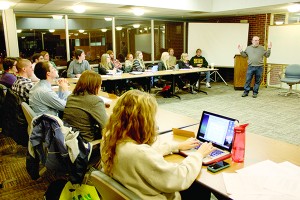In Katerina Klawes’ mind, transparency between NMU administration and students was the biggest issue that emerged when she was elected ASNMU president last spring. She said whether it was about sexual assault, tuition or other campus-related issues, it circled back to transparency.
For that reason, ASNMU will run a referendum to establish a Freedom of Information Act (FOIA) fund for students to vote on in the upcoming March elections.
The fund would draw from the Student Activity Fee, which is tacked into tuition costs. According to Klawes’ math, a 10-15 cent pull from each student’s activity fee would put $2000 into the fund, which students could tap to FOIA university documents, if necessary.
ASNMU would alter the Student Finance Committee’s by-laws to allocate certain amounts of money to FOIA requests, according to ASNMU Treasurer Vito Giannola.
“It would pretty much free up the whole situation we dealt with this year,” Giannola said. “The controversies over the last month were the catalyst for it.”
He added that it would be on a first-come, first-served basis, but Klawes said that if the FOIA fund was tapped completely, that more money could be added by ASNMU.
Klawes thinks a FOIA fund would encourage better transparency and student engagement with administration.
“If you want a well-rounded campus, you need transparency. If you want transparency, students need access to university records,” Klawes said. “The biggest deterrent to access is cost.”
Klawes said she wished the university would give students that access free of cost, but because that isn’t the case, a separate solution should be found.
If enacted, students could petition ASNMU for funding to pursue their own FOIAs, which can be charged for personnel costs on the recipient’s end.
Since The North Wind’s FOIA controversy began, several students have approached Klawes with questions about what FOIA is and what the issue means to the university. Some asked that ASNMU investigate the matter.
Klawes plans to find NMU’s annual FOIA-request costs to set a baseline goal for the fund.
Klawes emphasized that if students support it, ASNMU will support it as the students’ representatives. She said she thinks administration should respond similarly.
Though the FOIA fund was not discussed at Monday’s ASNMU meeting, President Fritz Erickson discussed FOIA in his first address to the student government. He said he has an “unending belief” in transparency, but that it has limits.
“Transparency is balanced against an individual’s right to privacy,” Erickson said, adding that both are important to his administration. “We should be proactive and we should get documents out ahead of time.”
Giannola noted that other Michigan universities have FOIA funds.
“They make their schools transparent and that’s the point,” Giannola said.
Giannola expects a positive student response. ASNMU will distribute a campus-wide email seeking student feedback on the issue, as well as seek broad student input to ensure the referendum is right for this year’s elections.
Klawes has encountered roadblocks to accessing public documents herself, even ancient ones.
“I did an ASNMU historical report in the archives and I was requesting Board of Trustees minutes from 1954,” Klawes said. “I had to FOIA those records.”






























